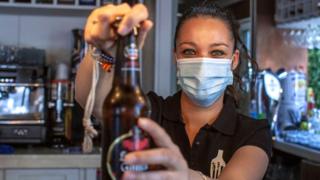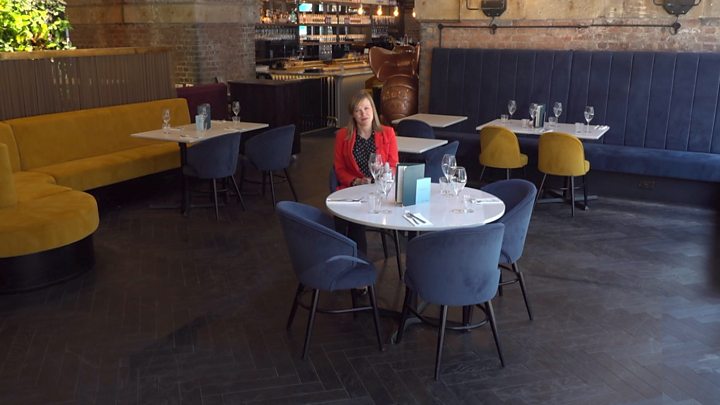Coronavirus: When will pubs, bars, cafes and restaurants reopen?
 Image copyright
Getty Images
Image copyright
Getty Images
Pubs, bars, cafes and restaurants in England will soon be able to welcome customers inside for the first time since lockdown began in March.
Prime Minister Boris Johnson said on 23 June that they would be able to reopen on 4 July.
He also announced that two metre social distancing would be relaxed to "one metre plus", with some conditions.
But despite the easing of restrictions, a trip to a local bar or place to eat could be a very different experience from how it was before the coronavirus outbreak.
When will reopening begin?
On 20 March, all pubs, bars, restaurants and cafes were asked to shut in order to stop the spread of coronavirus.
The only exceptions to this were cafes and canteens at a few selected places such as schools, hospitals and prisons.
Since then, many restaurants have started offering food delivery and takeaways to generate income while their doors are closed. Some pubs have also been allowed to offer takeaway beers.
From 4 July, pubs and restaurants in England will be allowed to reopen with certain restrictions, including changes to shift patterns, mandatory table service and more use of hand sanitiser. The guidelines are due to be updated soon, a government spokesperson said.
Customers will also have to give their details to staff to make contact tracing easier if another customer tests positive for the virus.
What about the rest of the UK?
Each nation is setting its own rules for the reopening of food and drink outlets:
What other measures may be taken?
At the weekend, Health Secretary Matt Hancock suggested people visiting pubs may have to register before going for a pint.
He said the government is looking at ways to strengthen contact tracing, as the economy reopens.
The Mexican restaurant chain Wahaca says it is considering a range of measures to keep staff and workers safe.
Customers are likely to be given the option of ordering food on apps, while staff will be encouraged to wash their hands every 20 minutes.

Meanwhile, the Wetherspoons pub chain has said its staff will be provided with face masks and protective eyewear and it will run a reduced food menu.
Bottles of ketchup and mayonnaise will be replaced by individual sachets. Customers will also be encouraged to sit outside in pub gardens, while some indoor seating areas will be separated by Perspex screens.
How did the hospitality sector cope during lockdown?
The hospitality sector was the third-largest employer in the country in 2018, according to UK Hospitality.
But many restaurants and cafes were already struggling even before the Covid-19 outbreak, in the face of rising rents and falling consumer spending.
In the lockdown, job cuts and closures were announced by chains such as Frankie & Benny's and Carluccio's.
3rdlargest UK employer in 2018
3.2 millionworkers in the sector
99%of hospitality businesses are SMEs
£130bnannual turnover in 2018
67%expect it will be "months" before going to a restaurant
Thousands of workers in the industry have been furloughed under the government's job retention scheme, which allows them to receive 80% of their monthly salary up to £2,500.
What have other countries done?
Many other countries have already reopened restaurants, bars and cafes around the world. In some cases they have had the use of lower social distancing recommendations - in France, for example, the recommended distance between customer and staff is 1m.
- Eating and drinking establishments in Paris can now serve customers on outside terraces, but staff must wear masks, and customers must also wear masks when moving around
- In Berlin, restaurants, cafes and snack kiosks are open, and people from two separate households are allowed to share a table, if they keep a distance of 1.5m from each other
- Spanish bars and restaurants have now been allowed to reopen if they stick to social distancing rules and only operate at 50% capacity
- Restaurants, bars and cafes in Italy reopened in May - restaurants must host reduced numbers of diners, with tables further apart and plastic shields to separate customers